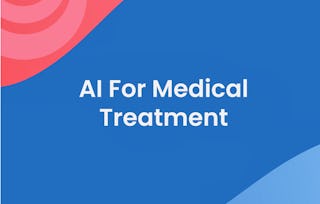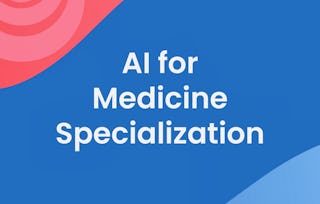AI is transforming the practice of medicine. It’s helping doctors diagnose patients more accurately, make predictions about patients’ future health, and recommend better treatments. This Specialization will give you practical experience in applying machine learning to concrete problems in medicine.
Ends soon: Gain next-level skills with Coursera Plus for $199 (regularly $399). Save now.

AI for Medical Prognosis
This course is part of AI for Medicine Specialization



Instructors: Pranav Rajpurkar
31,924 already enrolled
(799 reviews)
Recommended experience
What you'll learn
Walk through examples of prognostic tasks
Apply tree-based models to estimate patient survival rates
Navigate practical challenges in medicine like missing data
Skills you'll gain
Details to know

Add to your LinkedIn profile
4 assignments
See how employees at top companies are mastering in-demand skills

Build your subject-matter expertise
- Learn new concepts from industry experts
- Gain a foundational understanding of a subject or tool
- Develop job-relevant skills with hands-on projects
- Earn a shareable career certificate

There are 4 modules in this course
Build a linear prognostic model using logistic regression, then evaluate the model by calculating the concordance index. Finally, improve the model by adding feature interactions.
What's included
11 videos3 readings1 assignment1 programming assignment4 ungraded labs
Tune decision tree and random forest models to predict the risk of a disease. Evaluate the model performance using the c-index. Identify missing data and how it may alter the data distribution, then use imputation to fill in missing data, in order to improve model performance.
What's included
15 videos1 assignment1 programming assignment3 ungraded labs
This week, you will work with data where the time that a disease occurs is a variable. Instead of predicting just the 10-year risk of a disease, you will build more flexible models that can predict the 5 year, 7 year, or 10 year risk.
What's included
16 videos1 assignment1 programming assignment2 ungraded labs
This week, you will fit a linear model, and a tree-based risk model on survival data, to customize a risk score for each patient, based on their health profile. The risk score represents the patient’s relative risk of getting a particular disease. You will then evaluate each model’s performance by implementing and using a concordance index that incorporates time to event and censored data.
What's included
24 videos4 readings1 assignment1 programming assignment3 ungraded labs
Earn a career certificate
Add this credential to your LinkedIn profile, resume, or CV. Share it on social media and in your performance review.
Instructors

Offered by
Explore more from Machine Learning
 Status: Free Trial
Status: Free TrialDeepLearning.AI
 Status: Free Trial
Status: Free TrialDeepLearning.AI
 Status: Free Trial
Status: Free TrialDeepLearning.AI
 Status: Preview
Status: Preview
Why people choose Coursera for their career




Learner reviews
799 reviews
- 5 stars
78.84%
- 4 stars
15.76%
- 3 stars
3.12%
- 2 stars
1.50%
- 1 star
0.75%
Showing 3 of 799
Reviewed on Apr 18, 2020
AI for Medical Prognosis gave me a panorama of machine learning models for patient survival prediction in a simple way.
Reviewed on Apr 25, 2020
This was a wonderful course, I am now able to see how this course relates to the actual medical field, where we go from diagnosis to treatment and finally prognosis.
Reviewed on Sep 8, 2020
This course is one of the best courses to learn about Medical Prognosis. Really, the survival models were described in great detail. Thank you, Pranav for this wonderful course.

Open new doors with Coursera Plus
Unlimited access to 10,000+ world-class courses, hands-on projects, and job-ready certificate programs - all included in your subscription
Advance your career with an online degree
Earn a degree from world-class universities - 100% online
Join over 3,400 global companies that choose Coursera for Business
Upskill your employees to excel in the digital economy
Frequently asked questions
To access the course materials, assignments and to earn a Certificate, you will need to purchase the Certificate experience when you enroll in a course. You can try a Free Trial instead, or apply for Financial Aid. The course may offer 'Full Course, No Certificate' instead. This option lets you see all course materials, submit required assessments, and get a final grade. This also means that you will not be able to purchase a Certificate experience.
When you enroll in the course, you get access to all of the courses in the Specialization, and you earn a certificate when you complete the work. Your electronic Certificate will be added to your Accomplishments page - from there, you can print your Certificate or add it to your LinkedIn profile.
Yes. In select learning programs, you can apply for financial aid or a scholarship if you can’t afford the enrollment fee. If fin aid or scholarship is available for your learning program selection, you’ll find a link to apply on the description page.
More questions
Financial aid available,